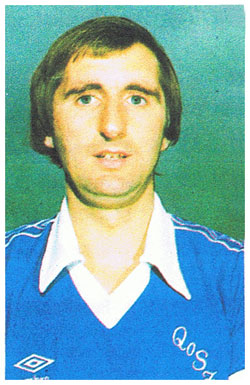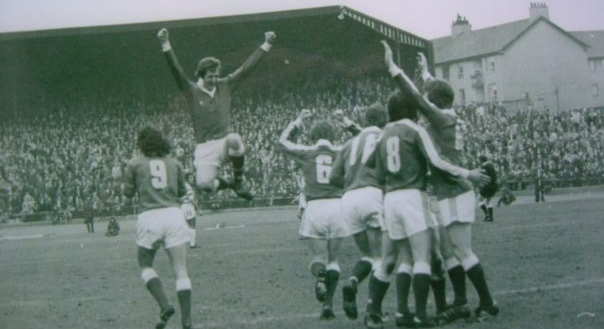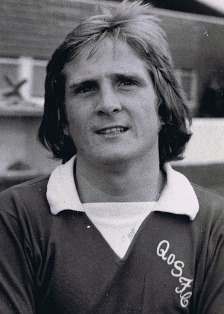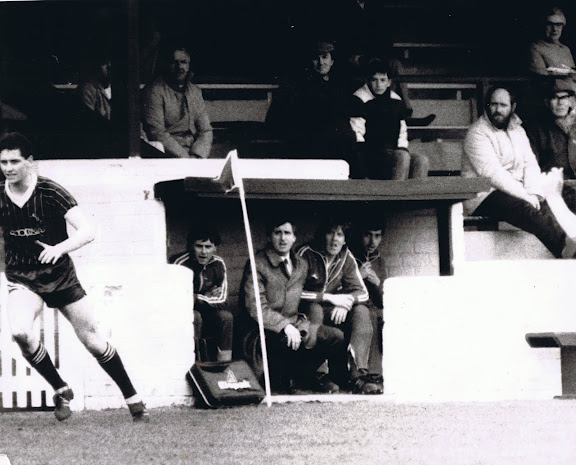The defensive cornerstone of the 70s and 80s made 340 QoS first team appearances. Nobby Clark is the only man to taste promotion success with Queen of the South as a player and then do the same as manager on a separate occasion.
Nobby Clark contributed to this article with an interview in August 2009.

"I was born in April 1950 in Glasgow. I was with Partick Thistle from 1968 to 1975. 154 games I played scoring one single goal. That was against Rangers at Ibrox, a New Year’s Day game [1974], a one each draw. It was quite unusual for Thistle in these days to get a draw at Ibrox. There was a cross and long looping run from myself to meet the header and put it in the back of the net. It was an equaliser late on in the game, so that secured us a point. My solitary goal for Thistle, at least it was against some sort of a quality team.”
Clark was at Firhill at the time of the club’s greatest post war achievement and the most famous result in their history. On Saturday 23rd October 1971, Sam Leitch memorably commented on BBC TV’s lunch time football slot, “’In Scotland, its League Cup final day at Hampden Park, where Celtic meet Partick Thistle, who have no chance." Jock Stein’s Celtic had reached the European Cup Final in Milan only five months before, destroying Don Revie’s Leeds United home and away in the semi. A player who had since established himself in the Celtic first team since the San Siro game was Kenny Dalglish. Leitch’s comment thus hardly provoked a tsunami of questioning of his sanity. With the sort of result that today’s QoS fans can only dream of against the Old Firm, Leitch was proved to have been reckless with his opinion.
Clark’s recollection of events - “I actually played three games in the early rounds against Arbroath, East Fife and Raith Rovers. I then went down with flu so that’s what knocked me out the team; taking over at number five was Jackie Campbell. I didn’t regain my place in time for the final. In these days they only had one substitute so I was a spectator up in the stand just going delirious, unbelievable. We were 4-0 up at half time. Kenny Dalglish scored one and it finished 4-1. Travelling back with the cup through Glasgow city centre, there was no motorway in these days so you had to go through the city centre from Hampden to Maryhill. And of course the amount of crowds on street corners was, it was just an unbelievable result so the response was great. At the end of the day I was fortunate enough to get a medal; it was one of the highlights of being at Thistle. These celebrations are still going on; I’m just actually going to a dinner in October which will be the 38th anniversary of the final.”
“It was one of these things as well; it got us into Europe the next season. I played in both ties against Honved of Hungary [the Budapest side had provided the likes of Ferenc Puskás to be the nucleus of the exceptional Hungarian national side of the early and mid 1950s who thrashed England featuring Ivor Broadis 7-1]. I got the man of the match award in both games. We got beat 1-0 in Hungary which was probably quite a favourable result, and then of course, inexperience, we actually got beat 3-0 at home. So it was a two game wonder as many Scottish teams have experienced. It was still a great experience. They were a top team at the time, they were a top Hungarian side then. There was a 17 000 crowd at Firhill on September 27th 1972.”
Clark’s travels to then communist Hungary.
“It wasn’t a football recollection but I remember we went to the cinema, and it was Hungarian sub titles because it was a British film. It was quite easy for us to hear the dialog. But the Hungarians needed their language in subtitles and I remember a chap called Colin Smith actually lit up a cigarette in the cinema and he must have had about 12 people jumping on him. It was actually a wooden cinema, so even away back in these days they must have had certain standards that you don’t smoke in the wooden cinema.”
The transfer to Queen of the South.
“In the last year at Thistle, Bertie Auld came in. Bertie Auld and I, it was just a different manager, different style. I think I played over 20 games that season for him, I don’t think it was a problem with my ability or anything, it was just his style and what I felt was better, so he released me at the end of the season, 74/75. I had an offer from Airdrie, an offer from Motherwell, and not for any particular reason, I came down to Queen of the South,” said Clark with a cheerful tone of, ‘Why the heck not,’ in his voice.
Life at QoS.

(QoS celebrate scoring against Celtic. Clark is the player on his way into orbit.)
“I think the early days, that was probably one of the strongest teams. I came into the team that just won promotion into the first division [this was the first season with a return to a three league set up. If the previous 2 league set up had remained in place, Queen's would have been promoted back to the top flight as divisional runners up]. That was full of the Tommy O’Haras, the Crawford Boyds, Allan Ball, Ian McChesney, George Dickson, Billy McLaren, Ian Reid, John Dempster. It was a real settled team. Ok, I got into the team after the first few games and then was probably never out of it. That was a fine Queen of the South team but like everything else, these things break up. Players go; Jimmy Miller went, Tommy O’Hara went, so of course these things happen. That was a team who had great potential and a good manager in Mike Jackson. Mike Jackson is a fine, fine, guy to play for. A lot of ourselves would run through a brick wall for Mike. The crowds were good then at Palmerston so it was a good time down there.”

(Tommy O’Hara)
“The game that sticks out in everybody’s mind is the Scottish Cup replay, the 5-4 against Ayr United. We took them back to Palmerston after a draw at Somerset. It was one of these nights under the floodlights. I scored Queen of the South’s first goal that night, but it was just one of these games, it was a ding dong, for people still to be talking about it nowadays shows you the impact that game made that night.”
“I came up for a corner. They had scored first so it was an equalising goal so that was important because Allan Ball had got injured [in the first game at Somerset Park]. The obvious thing was we were missing Allan Ball which was really, really crucial. And for them to score first, for us to equalise gave us that impetus to go on and we came out on top.”
“I think the game that we all loved most was the 6-0 League Cup defeat of Dundee including Gordon Strachan in that side at Palmerston. We had a victory at Easter Road against Hibs in an earlier round. We just had that sort of culture about us; we did have a lot of good players. Geographically it’s not the easiest place, but yet, we were able to put together a side. I think that Mr Harkness did probably go into his wallet to secure these players and I think that probably helped as well. It was just one of these nights, we were just overwhelming. You just get nights like that, if a ball comes up the park you can’t miss a header, if the ball comes into the goal mouth you can’t fail but score. It was just one of these nights that 11 guys were at the top of their game. It’s difficult to know why these things happen, but you just feel so strong and so fit and so up for it. And that might just be what I am saying about Mike Jackson, a lot of credit, a team gets prepared by the manager, and on the night he just gave us that confidence to go out and win 6–0. “
Clark’s promotion as a QoS player.
“That campaign actually went to the last game of the season. I know Cowdenbeath were involved and Cowdenbeath were playing at home that day and we were at home to Albion Rovers. Somebody had won the league [Queen's Park] and we were vying for second place. If Cowdenbeath had got beat at home and we won, I think that was the scenario. And even in these days there’s obviously information getting fed to the Queen of the South supporters at Palmerston. The word was coming through that Cowdenbeath were getting beat, and we were winning. I think Jimmy Robertson had a real bumper of a day that day. I remember he scored a couple of goals. But I recall in the middle of the park waving my arms in the air actually during the playing period, knowing full well that we were going to get promotion, and we did at the end of the day. That was just fantastic of course to get success. It doesn’t come that often, so yes, it was a great feeling.”
Then as manager came what Clark felt was the better of the two promotion sides he was involved with at Palmerston.
“Drew Busby had a go at it for a couple of seasons. In Drew Busby’s second season we were more or less on the road to promotion. And yet fate just worked its way. I don’t think we won any of the last six games and he left at that point. It was a decent pool of players, yet with its own problems. So over the course of the next few weeks I offered myself to take over. I would have been 34, 35, and offered my services and got the job and I inherited the problems. Problems like for example, Pat McCluskey was working on the rigs for maybe four weeks out of eight. For four weeks he didn’t play for Queen's and then for the other four weeks he was playing.”

(Nobby Clark in the QoS dugout along with Ian McChesney)
“We managed to get a wee clear out at the end of my first season and we brought in Tommy Bryce from Stranraer, Jim McBride from Stranraer. You know the impact Tommy Bryce made. Bobby Parker came in, we managed to get wee Billy Reid, things just clicked. We managed to get ourselves a formation, we had a goal scorer in Tommy Bryce, we had defenders in Kevin Hetherington and Bobby Parker, we had a fantastic goalkeeper in Alan Davidson, we had width with Jimmy Robertson on one side and Billy Reid on the other, full backs Graeme Robertson, George Cloy, Tony Gervaise. It’s amazing, you can say that you can be lucky in football, yes, and things, they do just click.”
“The first game we beat Stenhousemuir 2 – 0 at home in the league, it was just a fantastic booster after struggling at the end of the first season that just wasn’t enjoyable at all. So that was the start we needed. The best football we played was the 5-1 victory over Cowdenbeath at Palmerston. I recall we actually went down 1-0 in that game and at half time we were either 3-1 up or 4-1 up. I remember going up at half time and standing on the touchline and applauding all the players off. It was just fantastic; we just slaughtered Cowdenbeath after going 1 down.”
Tactical insight from the manager?
“The home game against Dunfermline which was a top of the table clash. Norrie McCathie was their lynchpin at the back. And we found out that he was injured for our game, which was a real booster. We agreed to go to St Joseph’s College, we met there about 12 o’clock. We had an hour just doing some set pieces, corners, free kicks, crosses, and we felt that because Norrie McCathie wasn’t playing, we would dink every ball possible into the near post. It was just something I thought, ‘Right, their obviously going to have a different central defensive partnership, they’ll be expecting us just to throw balls into the middle of the box’. So we thought, ‘Right, we’ll change it and we’ll put balls low into the near post, cause we had sort of ‘quicks’; Tommy Bryce was quick, Stewart Cochrane was quick. And we ended up winning 3-1 and two of the goals were from that exact scenario. So it just shows you, things do work out in football.”
In listening to Clark speak it is obvious very quickly that he is intelligent and articulate. If stating your own errors is a sign of greatness then that description can be applied to Clark also. “From there we should have gone on to win the divisional title that season. It was my fault that we didn’t. Looking back I allowed the players to take their eye off the ball a little bit. It was inexperience on my part.”
None the less this was still a successful season and Clark was held in high esteem at Palmerston. Then a head scratching episode followed.
“We had a board meeting and I suggested that we need to sign another four players. At the same meeting the board came up with the scenario that we’d got promotion but we weren’t going to give the players any sort of increase in their basic salary, but they would increase the bonuses. So the end result of that was that four of the players refused to re-sign. So that was four players that didn’t want to re-sign and we didn’t sign the other four players. So I felt I was eight players down, there was no help from the chairman in that situation who didn’t seem bothered, and the whole thing just got very, very strange. So I just thought, ‘I can’t work under these circumstances’. The Stranraer job was available, if any job was available I would have put myself up for it, it so happened it was that one. So I left after a difference of opinion with the chairman.”
After QoS and Stranraer.
“I concentrated on my day to day to work which was accountancy [ACCA specifically for any finance heads reading this], so I did that and obviously I had a family to feed so I settled back into day to day life, not regretting it one bit. You’ve got to make decisions in life and it was the right decision. There’s never been a case of, ‘Well, if only I’d stayed’, not at all, these things happen. When it came to 2001 I actually got back into football and I’m now with Motherwell, and I’m still there to this day, eight years of service, looking at the opposition. I’ve left Palmerston over 20 years ago. Motherwell have played Queen of the South at least twice anyway, two or three times [in Clark’s time at Motherwell], and every time I’ve been to go and watch them, it’s been an away fixture for Queen of the South, so I haven’t been back at all. I seen them at Falkirk one night last year in a cup tie, Motherwell were playing Falkirk the next week.”
“I seen St Johnstone on TV versus Queen of the South, I was actually doing a player scout for that one. Motherwell were interested in Stephen Dobbie. We ended up making him an offer but he actually signed for Swansea just a few days later. I followed the Scottish Cup run to the final. Absolutely astonishing. It wasn’t only astonishing, they were fully worthy of their place in the final. That’s what people shouldn’t forget, there were no ‘freak results’ or anything. They were ‘genuine’ results. The 4-3 result against Aberdeen wasn’t as though Aberdeen played badly or anything. It was a correct result for 90 minutes during that game that Queen of the South should have won 4-3. And even the final itself was quite astonishing, because Rangers were obviously nervous going into the final. And of course what happens, there’s always somebody comes to the fore, and on this occasion it was Kris Boyd scored a couple of fantastic goals unfortunately for Queen's.”
“But you can never deny what Queen of the South did, and to get into Europe, which is quite sensational. Actually I did a wee article and thought to myself, What would make the best Premier League in Scotland"? And I thought to myself, ‘Well why don’t they have a league of all the teams that have played in Europe’? And Queen of the South would have been in there. Actually at the time I did the article, Falkirk wouldn’t have been included. There’s another couple of surprising teams that wouldn’t have been included. There’s about 15 teams that have played in Europe so I thought to myself, ‘That would be a good reason just to have an SPL of all the teams that have featured in Europe.”
You’d get some support for that from Palmerston for obvious reasons. Not that there would be any parochialism or nepotism involved.
“The reason I thought about that as well was, ‘Let’s get the good old days back, let’s get Rangers and Celtic down to Palmerston, get Rangers and Celtic down to Cappielow and things like that.’ Because the chances of Rangers and Celtic getting back down to say Cappielow on a regular basis, on a league basis, it’s just going to be difficult because that first division is very, very competitive. But, whoar, to get a full house down at Palmerston on these situations, of course the Old Firm can turn you over, but by goodness, they need to work hard for it, yes.”
The best player Clark ever played directly against.
“That’s ironic as well because he’s an ex Queen of the South man, John Connolly. I made my Partick Thistle debut against him and St Johnstone in 1969. It was a League Cup tie and they beat us 6-0 and we had a good Thistle team in these days. But John Connolly ran riot and they had Henry Hall in these days. They’d just a fantastic St Johnstone team in these days [indeed Willie Ormond put together Perth’s finest ever side turning the club into European material, consequently resulting in Ormond’s appointment as Scotland manager]. So that was my baptism of fire. I knew that I would need to do a lot of growing up very quickly after facing John Connolly. I actually see John quite a lot, he’s an SPL delegate and he also works for a company called Scouting Network. So I do speak to John and because we’ve got the Queen of the South connection, we’ve got a bit of rapport between us.”
Nobby Clark’s 340 first team appearances for Queen of the South is the fifteenth highest in the club’s history as at August 2020. In his 276 league games Clark scored six goals.
Previous legend Legends menu Next legend